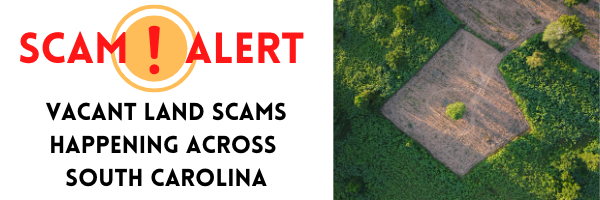Scam Alert: Vacant Land Scams
Fake Seller/Fake Buyer Scam Alert: Vacant Lots
The South Carolina Real Estate Commission is aware of a rise in fraudulent sales and mortgages, most commonly associated with vacant lots. The scam targets unencumbered, vacant lots owned by persons out of state. With this scam, South Carolina real estate licensees may be contacted by a person acting as the seller seeking to have a vacant lot promptly sold for below market value.
Licensees approached with requests are advised to verify that the seller matches the person on the land deed so as to be in compliance with S.C. Code Ann. § 40-57-135(E)(1), which requires a written listing agreement signed by the property owner.
If you encounter a property owner that has been a victim of an attempt to sell their property without their consent, encourage them to contact the secret service in their Charleston Field office at 803-388-0305 to report the fraudulent activities and get assistance in stopping the perpetrator.
The Scheme:
- The criminal searches public records to Identify real estate that Is free of mortgage or other liens and the identity of the property owner. These often include vacant lots or rental properties
- The criminal poses as the property owner and contacts a real estate agent to 11st the targeted property for sale, and requests It being listed below current market value to generate Immediate Interest
- The criminal, posing as the property owner, demonstrates preference for a cash buyer, and quickly accepts an offer
- The criminal, posing as the property owner, refuses to sign closing documents in person, and requests a remote notary signing
- The criminal (or co-conspirator) also impersonates the notary and provides falsified documents to title company or closing attorney
- Title company or closing attorney unwittingly transfers the closing proceeds to criminal
- All communication is electronic, not in person
Best Practices to Avoid This Scam:
- Independently search for the identity and a recent picture of the property seller
- Request an In-person or virtual meeting and to see their government issued identification
- Be on alert when a seller accepts an offer below market value in exchange for receiving the payment In cash and/or closing quickly
- Never allow a seller to arrange their own notary closing
- Use trusted title companies and attorneys for the exchange of closing documents and funds
Here are some other “red flag” actions to be aware of:
- The buyer/seller is traveling on vacation (sometimes abroad), claims they cannot meet in person, and has to do everything by email
- The seller has a family emergency, needs a quick cash sale, and will accept substantially less than full price if they can close in a very short time
- The email address or phone numbers are from another country. Of course, there are legitimate buyers and sellers who live overseas, but this does raise a flag that should be checked
- The photo IDs, such as drivers’ licenses or passports, are barely legible
- The Seller does not require a Due Diligence fee and/or low or no Earnest Money combined with a quick closing (in order to obtain quick proceeds before a scam is discovered)
- The buyer/seller makes constant excuses, is not able to perform the terms of the contract, or is not returning paperwork
- The buyer/seller gets very angry at the licensee as the transaction gets closer to closing and applies pressure on the licensee to make sure the deal goes through. Sometimes they offer an incentive such as commission bonuses or promising other opportunities to buy or sell









